|
In This Issue...
 |
Broken Bills |
 |
Molting |
 |
Wing Clipping |
 |
Blood Feather |
 |
Rescued Geese in Need of Homes |
 |
The Month in Photos! |
 |
Get to Know Your Predators: The Bald Eagle |
 |
Recommended
Viewing:
Million Dollar Duck |
 |
Reader Poll #14
|
|
The Month in
Photos!
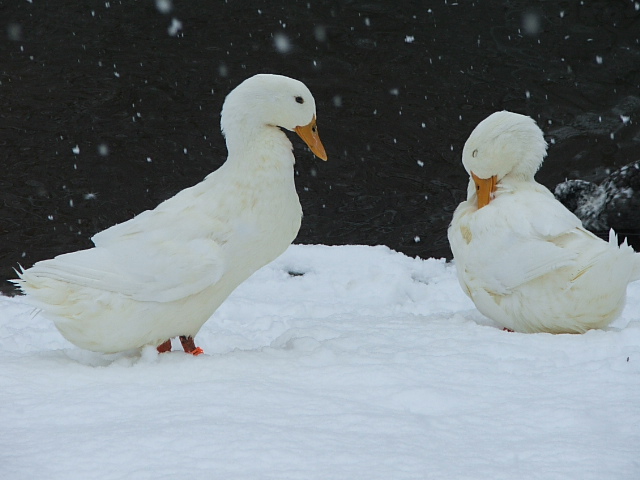
Puddles & Jeru
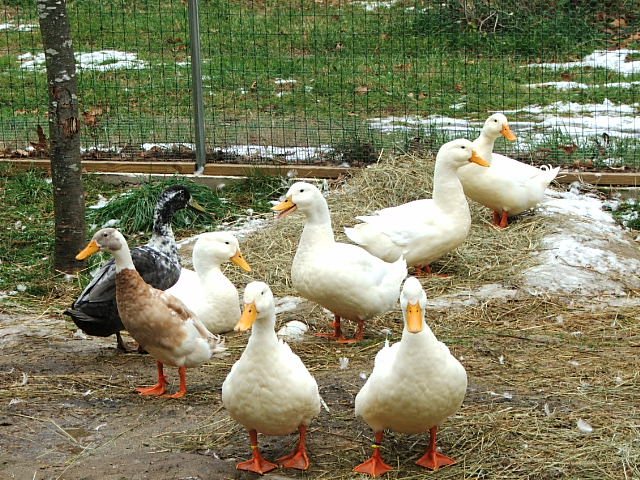
Eight new
ducks!
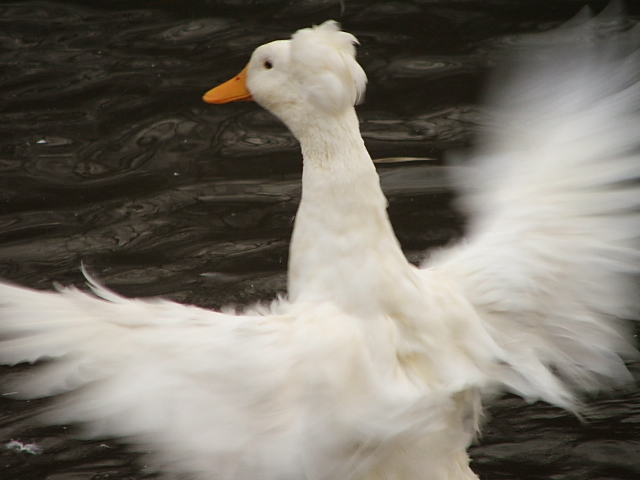
Amadeus angel...
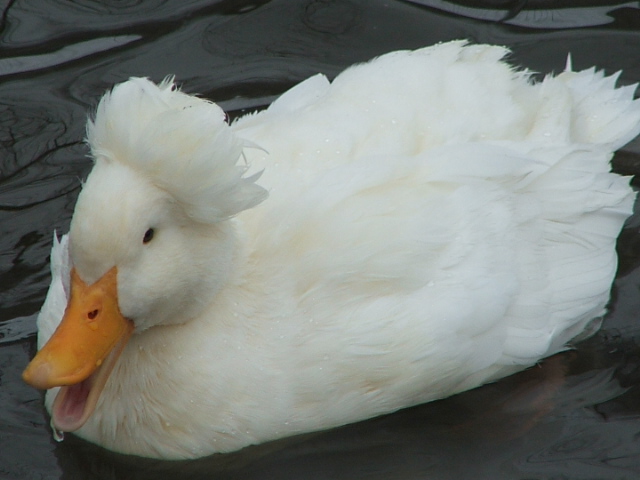
Amadeus Quacks up!
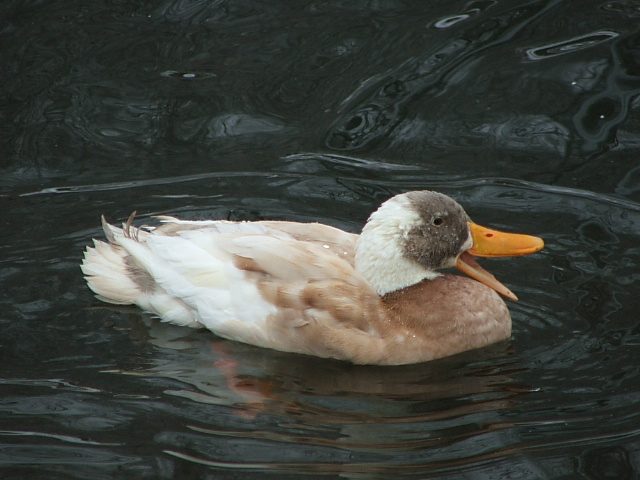
Joker tells a joke!
Get to Know
Your Predators: The Bald Eagle
The Bald
Eagle weighs in between 8 and14 pounds, with females being
larger than males. Bald eagles actively prey on waterfowl,
both ducks and geese. In active areas, it is not uncommon to
see them preying on Canada Geese. We know a couple families
in Connecticut who have lost their ducks and geese to this
formidable predator.
Recommended
Video*
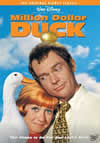
|
Ordering
information |
Million
Dollar Duck
By Noble S. Proctor
|
* |
For
our full recommended viewing/reading list, click
here. If you order from
Amazon.com by way of our web site, Majestic receives a
portion of the proceeds! |
Description
Disney’s classic 1971
comedy about the goose that lay the golden eggs returns in
digital format, retaining its old-style family-friendliness,
slapstick silliness, and good-natured predictability. Dean
Jones plays professor Albert Dooley, a lab worker down on
his luck, who lives in suburbia with his earnest yet
scatterbrained wife Katie (played deliciously by Sandy
Duncan).
When an under-performing
lab duck’s life is in jeopardy, Dooley rescues him to become
a family pet and soon discovers that some earlier exposure
to radiation has turned the duck’s eggs into gold. The
Dooley’s newfound wealth brings its share of pandemonium as
they try to keep their proverbial "nest egg" under wraps,
especially from nosy neighbor Finley Hooper (Joe Flynn), a
government Treasury man. Such low-tech fare is not without
touches of brilliance: Duncan gets to deliver the best lines
and does so with great panache. If Million Dollar Duck falls
short in inventiveness, this small serving of comfort food
satisfies with ample amounts of warmhearted cheer. (Ages 4
and older)
Reader Poll #14
Question: Would you
like us to devote a page on our website to recommended
movies about ducks and geese?
Results of Reader
Poll #13 How did
you find Majestic Waterfowl Sanctuary?
|
Newspaper/Newsletter |
6% |
 |
|
Veterinarian |
6% |
 |
|
Friend |
26% |
 |
|
Angel Wings WF Rescue |
32% |
 |
|
Carolina WF Rescue |
0 |
 |
|
Lame Duck Rescue |
0 |
 |
|
Pet Rock |
6% |
 |
|
PetFinder |
0 |
 |
|
MSPCA/Nevins Farm |
0 |
 |
|
Waterfowl/Poultry Forum |
6% |
 |
|
Online
Directory |
0 |
 |
|
AOL |
0 |
 |
|
Google |
6% |
 |
|
Yahoo |
6% |
 |
|
Other |
6% |
Contact Us
Majestic Waterfowl
Sanctuary
17 Barker Road
Lebanon, CT 06249
directorATmajesticwaterfowl.org
Our Newsletter
The Majestic Monthly is published 12 times per year. Back
issues can be obtained online from our
Newsletter Archives.
|
|
Broken Bills
We have been
contacted on a few occasions for advice on proper care when it comes
to damaged or broken bills. If your duck or goose breaks a piece of
their bill off, save the piece (if you have it) and seek
veterinarian assistance immediately. Bills do bleed when broken, so
you may need to use blood coagulant (which should be in your
medicine cabinet) to help control the bleeding until you arrive at
your vet’s office. They will often cauterize the bill to seal things
up nicely.
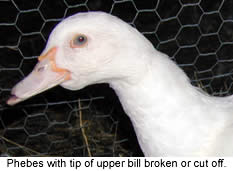 The
front tip of Phebes' upper bill was missing when she arrived (we
suspect it was cut off at a feather factory to keep her from
damaging her own or another duck’s feathers), but it may have been
lost due to frostbite. In any case, it was completely healed when
she arrived, but it caused a slight nuisance with her eating. She
did best on small pellets or, better yet, ground waterfowl feed. We
kept a water dish next to her food to help her wash her food down.
It may take them quite a bit of effort to eat and they may tire of
it quickly; if you notice this, just leave their food out at all
times. They may do better if they can just help themselves to the
buffet multiple times throughout the day, rather than just at one or
two daily feedings. The
front tip of Phebes' upper bill was missing when she arrived (we
suspect it was cut off at a feather factory to keep her from
damaging her own or another duck’s feathers), but it may have been
lost due to frostbite. In any case, it was completely healed when
she arrived, but it caused a slight nuisance with her eating. She
did best on small pellets or, better yet, ground waterfowl feed. We
kept a water dish next to her food to help her wash her food down.
It may take them quite a bit of effort to eat and they may tire of
it quickly; if you notice this, just leave their food out at all
times. They may do better if they can just help themselves to the
buffet multiple times throughout the day, rather than just at one or
two daily feedings.
Water should be made
available at all times to any waterfowl you have. In the case of an
exposed tongue, it is extremely important because the duck or
goose needs to keep its exposed tongue moist and comfortable.
Remember to use extreme caution in cold weather. An exposed tongue
can easily become frostbit. Do not leave ducks or geese with exposed
tongues outside during cold weather. They must be locked up in a
barn or shed to prevent exposure to the cold and wind.
Molting
We
also get a lot of questions regarding molting. The most common
question is, “when do ducks molt?” In our experience, in our
Connecticut climate, the hens go through a wing feather molt in late
spring/early
summer and the drakes go through theirs in late summer/early Fall.
The whole gang
tends to go through a body feather molt in the late fall. However,
we have noticed that each duck has its own molting style. Some ducks
don’t molt “on time”--some ducks molt early and others late.
Some ducks molt a lot with feathers scattered everywhere, while
others drop only a few feathers.
If your duck or goose has healthy feathers do
not worry at all about molting. Just let nature take its course. If
you are feeding anything other than Mazuri Waterfowl Maintenance,
some sources recommend mixing an un-medicated flying game feed
(which you can ask for at your local grain store) into their food
during the dropping and re-growing of feathers, but this is not
necessary.
Some
things to keep in mind:
 |
If your duck or goose is not
molting and their feathers are in good condition, our vet
has advised us not to worry, provided the bird is on a
proper diet. |
 |
If your duck or goose is not
molting and their feathers are in poor condition, the
problem is most commonly a nutritional issue. Evaluate your
waterfowl’s diet: |
- Are
you feeding your feathered friend food that is not designed
for waterfowl?
- Are
you offering your duck unhealthy snacks?
 |
Nutritional deficits are the
most common cause of feather problems, so if you answered,
“yes” to either of the two questions above, this is most
likely the source of the issue. Remedy your duck or goose’s
diet and you will most likely remedy the problem |
 |
Our vet does not recommend any
forced-molt tactics for your feathered friends, and we are
in agreement. They are unhealthy for your bird and should
not be attempted. |
Wing Clipping
If
you need to clip wings to keep your duck from flying or gliding, it
is vital that you learn to do it from a professional. Have your
duck-qualified vet or a qualified local waterfowl breeder teach you
how to do this. Some feathers have pink centers; these are called
blood feathers because there is an artery and a vein inside. If you
cut them, your duck can bleed profusely and even die, so it is very
important that you learn to clip wings from someone who knows what
they are doing.

Our Muscovy hen "Frankie" shows us her clipped wing
Blood Feather
A
broken blood feather can be deadly. If a blood feather breaks for any
reason it will need to be plucked out. The ENTIRE feather shaft must
be removed for the bleeding to stop.
This won’t
necessarily be an easy task, nor will your duck appreciate it, but
it will need to be done. You will need a pair of needle nose pliers
to do the plucking and preferably a helper to hold the duck still
and the wing steady while keeping it supported. Feel around and find
the exact spot where the troubled feather goes into the skin on your
duck’s wing. You will feel a bump under the skin where the feather
ends. Before you pull the feather, you are going to want to apply
pressure by pinching the wing right behind this bump, which is the
base of the feather.
Pliers need to grip
the pinfeather as close to the base as possible, near to the skin.
Keep calm, take a deep breath, and give it one firm, smooth pull,
being sure to pull the feather STRAIGHT OUT of its hole, in the
direction of feather growth. At the same time you pull the
feather out with one hand on the pliers, use your other hand to
pinch and slide your fingers forward in one steady motion, following
the feather as it pulls out.
Once the feather is
out, use a small amount of blood coagulant applied with a cotton
swab to stop the bleeding. Apply a sterile gauze pad over the wound
and apply mild pressure for one minute. If bleeding does not stop,
add another layer of gauze over the first and continue to apply
pressure and head for your vet’s office right away.
Next time you are
visiting your waterfowl vet, ask them for a demonstration, so you
will be properly prepared for an emergency.
The other alternative
is to put blood coagulant right on the feather break to control the
bleeding and then rush your duck to a vet to have them pull out the
feather.

Rescued Geese in Need of
Homes
Phipps
Country Store and Farm in Pescadero California recently took in 46
adult geese that were rescued from a nearby city park pond. They now
need to find suitable homes for them. If you are able to provide a
loving home for one or more of these geese, please fill out an
online Adoption Application at their website (www.phippscountry.com).
There is no charge for the geese but all prospective adopters must
fill out an application and meet certain requirements.
Please Note: They are unable to
ship geese so you would need to make arrangements to pick them up.
Pescadero is located on the coast of California between Half Moon
Bay and Santa Cruz off Highway 1.
They have four kinds
of geese: Chinese, Embden, Toulouse, and mixed (a combination of two
of the previous three breeds).
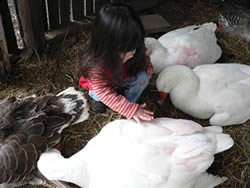
Michelle helping to comfort the
rescued geese
The taking in of these geese will result in a lot more feed,
cleaning, and maintenance costs for the people at Phipps. How you
can help: (1) Make a donation through their
website;
(2) Purchase items from the
Phipps Online Country Store; or
(3) Adopt a goose or two from them [information
and application].
|